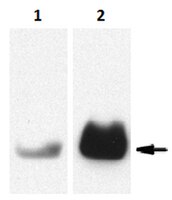MABT340 Sigma-AldrichAnti-Proteinase 3/PR3 Antibody, clone MCPR3-2
Anti-Proteinase 3/PR3 Antibody, clone MCPR3-2 is an antibody against PR3 for use in Affinity Binding Assay, ELISA, Flow Cytometry, and Western Blotting.
More>> Anti-Proteinase 3/PR3 Antibody, clone MCPR3-2 is an antibody against PR3 for use in Affinity Binding Assay, ELISA, Flow Cytometry, and Western Blotting. Less<<Recommended Products
Overview
| Replacement Information |
|---|
Key Spec Table
| Species Reactivity | Key Applications | Host | Format | Antibody Type |
|---|---|---|---|---|
| H | WB, ABA, ELISA, FC | M | Purified | Monoclonal Antibody |
| References |
|---|
| Product Information | |
|---|---|
| Format | Purified |
| Presentation | Purified mouse monoclonal IgG1κ antibody in buffer containing 0.1 M Tris-Glycine (pH 7.4), 150 mM NaCl with 0.05% sodium azide. |
| Quality Level | MQ100 |
| Physicochemical Information |
|---|
| Dimensions |
|---|
| Materials Information |
|---|
| Toxicological Information |
|---|
| Safety Information according to GHS |
|---|
| Safety Information |
|---|
| Storage and Shipping Information | |
|---|---|
| Storage Conditions | Stable for 1 year at 2-8°C from date of receipt. |
| Packaging Information | |
|---|---|
| Material Size | 100 μg |
| Transport Information |
|---|
| Supplemental Information |
|---|
| Specifications |
|---|
| Global Trade Item Number | |
|---|---|
| Catalogue Number | GTIN |
| MABT340 | 04055977333596 |
Documentation
Anti-Proteinase 3/PR3 Antibody, clone MCPR3-2 SDS
| Title |
|---|







